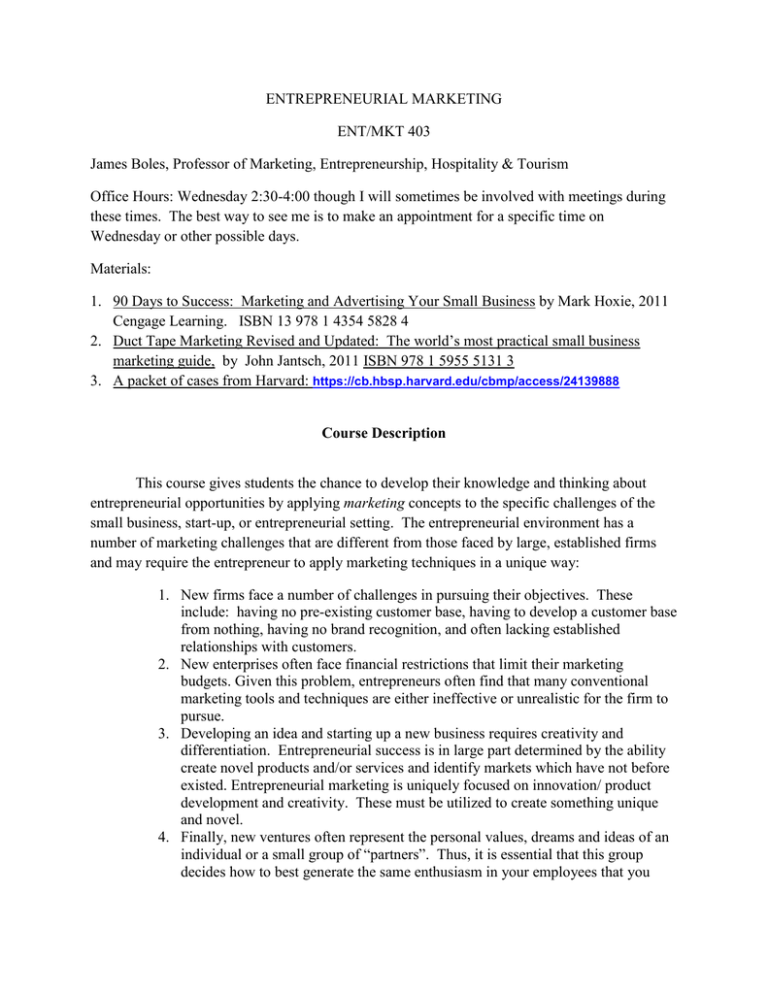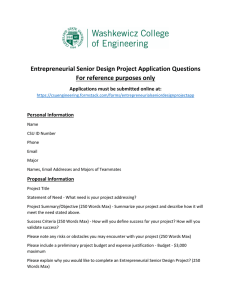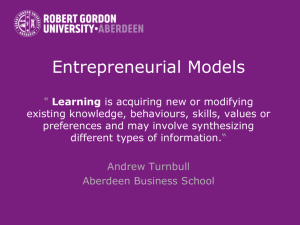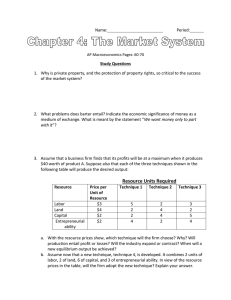ENTREPRENEURIAL MARKETING ENT/MKT 403
advertisement

ENTREPRENEURIAL MARKETING ENT/MKT 403 James Boles, Professor of Marketing, Entrepreneurship, Hospitality & Tourism Office Hours: Wednesday 2:30-4:00 though I will sometimes be involved with meetings during these times. The best way to see me is to make an appointment for a specific time on Wednesday or other possible days. Materials: 1. 90 Days to Success: Marketing and Advertising Your Small Business by Mark Hoxie, 2011 Cengage Learning. ISBN 13 978 1 4354 5828 4 2. Duct Tape Marketing Revised and Updated: The world’s most practical small business marketing guide, by John Jantsch, 2011 ISBN 978 1 5955 5131 3 3. A packet of cases from Harvard: https://cb.hbsp.harvard.edu/cbmp/access/24139888 Course Description This course gives students the chance to develop their knowledge and thinking about entrepreneurial opportunities by applying marketing concepts to the specific challenges of the small business, start-up, or entrepreneurial setting. The entrepreneurial environment has a number of marketing challenges that are different from those faced by large, established firms and may require the entrepreneur to apply marketing techniques in a unique way: 1. New firms face a number of challenges in pursuing their objectives. These include: having no pre-existing customer base, having to develop a customer base from nothing, having no brand recognition, and often lacking established relationships with customers. 2. New enterprises often face financial restrictions that limit their marketing budgets. Given this problem, entrepreneurs often find that many conventional marketing tools and techniques are either ineffective or unrealistic for the firm to pursue. 3. Developing an idea and starting up a new business requires creativity and differentiation. Entrepreneurial success is in large part determined by the ability create novel products and/or services and identify markets which have not before existed. Entrepreneurial marketing is uniquely focused on innovation/ product development and creativity. These must be utilized to create something unique and novel. 4. Finally, new ventures often represent the personal values, dreams and ideas of an individual or a small group of “partners”. Thus, it is essential that this group decides how to best generate the same enthusiasm in your employees that you have for the venture, and communicate that enthusiasm to your customers so that they too “buy-in” to the dream. The course is builds on the knowledge and skills students have already gained in other classes. Specifically it will challenge the students to adapt those skills and insights to the specific challenges of the entrepreneurial situation outlined above. As a result of the emphasis on implementation challenges, the course will feature the development of a workable Marketing Plan. The Marketing Plan will help the student in identifying an entrepreneurial value proposition. Upon completion of this course, students should be able to: Identify the role of marketing in each stage of the entrepreneurial process; Identify entrepreneurial opportunities from the emerging trends occurring in marketing practice around the world; Conduct exploratory research to uncover opportunities, customer needs and preferences Identify ways in which marketing inputs can enhance the new product/service development process; Apply entrepreneurial thinking to market segmentation and targeting decisions; Develop inexpensive yet reliable and valid approaches to conduct market research for entrepreneurial concepts; Identify how to network and leverage resources in entrepreneurial ventures, and ways that marketing can facilitate both of these activities; Demonstrate entrepreneurial approaches to formulating product, price, promotional and distribution strategies and action programs; Design creative approaches to marketing communications under conditions of severe resource limitations; The classroom pedagogy will be primarily case-based, but will also involve readings, lectures, and class discussions. The case approach has a number of advantages; it involves the study of many entrepreneurial marketing problems, it emphasizes practical learning over theoretical concepts, it allows the student to develop their personal approach to the subject, and, most importantly, it is a high-energy/ enjoyable classroom experience. However, to be successful, case-based learning places additional responsibilities on the student; the cases require a high level of preparation- active analysis and creativity rather than simple reading and absorption, regular meetings with fellow students in study-groups before class is strongly recommended, and a willingness to participate enthusiastically in class discussions is critical. Outside of the classroom the emphasis will be on conducting face-to-face exploratory field research. As instructor I have the following responsibilities: 1. 2. 3. 4. 5. Come prepared to every class with a well-thought-out class Design my class so you can accomplish my cognitive objections listed in the syllabus Consider that it is not always your fault if you don’t understand the material. Create a mutually respectful classroom environment. Recognize that sometimes I may grade a question incorrectly and not get defensive when you politely question a grade. As students you have the following responsibilities: 1. Come prepared to every class by reviewing previous notes and doing assignments. 2. Complete all work on time with proper thought. 3. Consider that it is not always the instructor’s fault when you don’t understand the material. 4. Treat others (including the instructor) with respect. 5. Ask questions when you don’t understand. Asking questions is a sign of maturity, not ignorance. 6. Understand that I am not trying to “nit-pick” when I grade you exams or homework. However, the current economic/selling environment requires exceptionally sound and articulate communication of ideas if one is to be successful in sales. Grading: Grades will be based on the following system: Participation in class discussion of cases and selected case write-ups 25% Mid-term Exam 25% Final Exam 25% Marketing Plan 25% Classroom Contribution This will have multiple components. First, you must attend class in order to participate. This includes the sales presentations of other students. Second, while attending class, you must take an active role in asking questions or making constructive comments during class discussions of the cases and readings. It is quite likely that you will be “cold-called” to discuss various assigned cases. These “cold-calls” will be at random throughout the discussion sessions. Thus, the Contribution Grade is composed of: 1) the in-class case discussions, 2) the in class readings and discussions of materials from the books, and 3) assigned case write-up(s). In addition, attending classes where outside business people (people on the front lines in this economy) are presenting is also important since these individuals will present materials that are far different – and more focused on a specific business -- than what will be presented in the lectures and cases. Tests The exams will be primarily multiple choice in nature and will cover the materials from the two books, selected course readings/cases, as well as issues related to your marketing plan. There also will be short answer questions worth approximately 10 points. Marketing Plan: The marketing plan is a detailed marketing plan based on the Marketing Plan Pro material. It should be a detailed plan for a new business. It is a team project. Teams, as a rule should consist of 4 - 6 people. In no case will a team have more than 6 members without my specific approval. The marketing plan should be based on a FEASIBLE idea for a new business. In some situations, I will allow an existing firm owned by a student, or an existing firm that is willing to work with the student team, to be the subject of the marketing plan (assuming that the team is willing to work on that topic). Obviously, an existing firm is a more realistic topic since there is someone who believes that it is a viable business. In addition, there will be records, an existing marketing program, and a budget from which to work. Advice Due to the nature of the course it is essential that you keep up with your readings and assignments. There is nothing more certain to negatively affect your grade than to get behind. It has been my experience that once a student gets behind during a semester, he/she rarely, if ever, fully catches up in the class. Final Grade A+ 97 - 100 Assignment A (93-96) Scale A- (90-92) Value Organizationa l equivalent Typical Percentage B+ (87-89) C+ (77-79) D (60-69) F (<60) B (83-86) C (73-76) B- (80-82) C- (70-72) Outstanding Excellence Mastered material Tagged Unacceptable the bases Unsatisfactor y Promoted Raise No Raise Reviewed Fired 15-20% 50-60% 20-25% <5% <5% COURSE POLICIES: SNAPSHOTS: To help me more quickly learn your names (necessary for accurate evaluation of participation) and for future references, please provide me with a copy of the picture from your ID and put your name on the back. Ideally, you can attach this to a resume or a brief biographical sketch regarding your educational background and work experience. This is due during the second class period. I also ask you to sit in the same seat every class so that I can record participation more accurately. General Policies regarding grading: Missing over 3 classes during the semester will result in a student being dropped from the course. While extenuating circumstances can result in this requirement being waived, it is unlikely. If you know you will miss more than 3 classes, you should drop the course today and add a different course with less stringent attendance expectations. Any grade appeal must be done within 2 weeks of the posting of grades. Students With Disabilities: Students who have a Letter of Accommodation from the Office of Disability Services should identify themselves to the instructor of this course as soon as possible. That way provisions can be made to help you become as successful as possible. Disruptive Behavior: Disruptive student behavior is student behavior in a classroom or other learning environment (to include both on-campus and off-campus locations), which disrupts the educational process. Disruptive class behavior for this purpose is defined by the instructor. Such behavior includes, but is not limited to, verbal or physical threats, repeated obscenities, unreasonable interference with class discussion, making/receiving personal phone calls or pages during class, leaving and entering class frequently in the absence of notice to instructor of illness or other extenuating circumstances, and persisting in disruptive personal conversations with other class members. For purposes of this policy, it may also be considered disruptive behavior for a student to exhibit threatening, intimidating, or other inappropriate behavior toward the instructor or classmates outside of class. When disruptive behavior occurs in a class…the instructor will warn the student. The warning will consist of orally notifying the student that his/her behavior is disruptive and that it must cease immediately or the student will face removal from the classes. Academic Integrity (Honesty): All university and college regulations concerning withdrawal and academic honesty will apply. Students are expected to recognize and uphold standards of intellectual and academic integrity. The university assumes as a basic and minimum standard of conduct in academic matters that students be honest and that they submit for credit only the products of their own efforts. Students should be familiar with the university’s policy on issues such as plagiarism, unauthorized collaboration, falsification, and multiple submissions. Lack of knowledge of this policy is not an acceptable defense to any charge of academic dishonesty. It is expected that you have visited and read the website regarding Academic Integrity. http://sa.uncg.edu/handbook/academic-integrity-policy/ Student Obligations a. Students should recognize their responsibility to uphold the Academic Integrity Policy and to report apparent violations to the appropriate persons. Students who do not understand the Policy or its application to a particular assignment are responsible for raising such questions with their faculty member. By enrolling in the University, each student agrees to abide by the Academic Integrity Policy. At the faculty member’s discretion, each student may be required to attest to abiding by or sign the Academic Integrity Pledge given below on all major work submitted to an instructor. A student’s work need not be graded until he/she has signed the statement. In signing the pledge, the student indicates his/her knowledge that the Academic Integrity Policy governs his/her academic activities at the University. Academic Integrity Pledge: I HAVE ABIDED BY THE UNCG ACADEMIC INTEGRITY POLICY ON THIS ASSIGNMENT. Signature_______________________________ Date___________ 1/15 1/22 1/29 Introduction of the course Divide into marketing plan teams Lecture on role of marketing and sales in business & Read Chapter 1 & 2 in Duct Entrepreneurship Metrics Tape Marketing Read Blue Ocean Strategy Building a Brand DVD (Ca. Management Review Read the Harvard Readings for discussion. version); The Customer has Escaped; and, Creativity and Innovation in Organizations Lecture on Buyer Behavior Case Analysis: What is Wrong at CoolBurst? (HBR Case) Read Ch. 13-14 in Duct Tape Marketing; Also Read Ch. 3 in 90 Days to Success; Marketing Plan Teams should be finalized Prepare CoolBurst Case 2/5 Case Discussion: Rosewood Hotels Prepare: Rosewood Hotels Case Planning Your Business Image Read Chapters 3-5 in Duct Tape Marketing 2/12 2/19 2/26 Prepare Case Write-up of the Conroy Acura Case (as a Group) turn in for a grade (2 page executive summary format. Write-up is due either in hard copy (turned in to my mailbox/office) or via email no later than Feb. 14th. Topic for Marketing Plans should be finalized Prepare: Conroy Acura Case; Also, use this time as a work session for your Marketing Plan Project Pricing DVD Lecture on Pricing Read Chapter 2, and 10 in 90 Days to Success Discuss the Fashion Channel Case Prepare Case: The Fashion Lecture on Advertising and Promotions 3/5 3/19 Guest Speaker Negotiations DVD Discuss: Phillips Foods Inc. Case Discuss Golf Logix Case Channel Read: Chapter 4, 7. & 8 in 90 Days to Success Prepare Case: Phillips Foods Inc.- Introducing King Crab to the Trade. Prepare Case: GolfLogix: Measuring the Game of Golf 3/26 4/2 4/9 4/16 4/ 23 Final exam period First Exam: 30 multiple choice questions and two- four short answer questions IN THE SECOND HOUR OF CLASS, WE WILL Discuss MyTeam.Com case Outside Assignment: CASE Write-up Assignment: Just US Café (Due via email on April 4th. Prepare Case: Fiji Water Also, meet in your group to begin finalization of your Marketing Plan Group meeting day for working on your marketing plan. Read Chapters 11-12 in Duct Tape Marketing; Personal Selling for small firms (Lecture) and discussion of assigned sales article and Strategic Selling DVD DVD on Influence Discuss Cardio Thoracic Case Presentation of Marketing Plans (All marketing plans are due on this date) Final Exam 30-40 multiple choice questions and 2 – 4 short answer questions Prepare Just US Café in a 2 page executive summary format (individual write-up) Prepare Cardio Thoracic Case MARKETING TEAM PARTICIPATION SHEET NAME ______________________________________________ TEAM PROJECT: ________________________________ This sheet is to be completed individually and privately by each team member prior to coming to class. Each team member’s participation evaluation sheet should be included with the team’s final project. Using a 100 point scale, please grade each member of your team based on their contribution to the semester project. Record the grades given in the blank spaces below adjacent to each team member’s name. Include the names and grades of all individuals in your group (including yourself): TEAM MEMBER’S NAME POINTS FOR CONTRIBUTION TO FINAL PROJECT 1. __________________________ __________ POINTS 2. __________________________ __________ POINTS 3. __________________________ __________ POINTS 4. __________________________ __________ POINTS 5. __________________________ __________ POINTS 6. __________________________ __________ POINTS On the space provided below (and on the back of this page if necessary) please explain the logic for the points you awarded. Please also indicate briefly the responsibilities of each team member:






